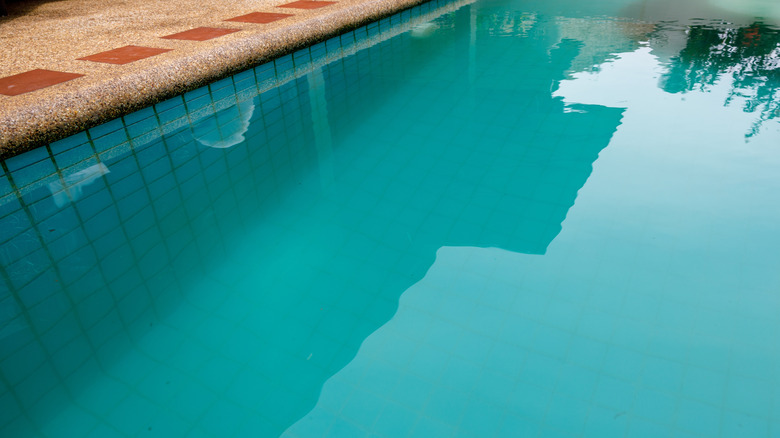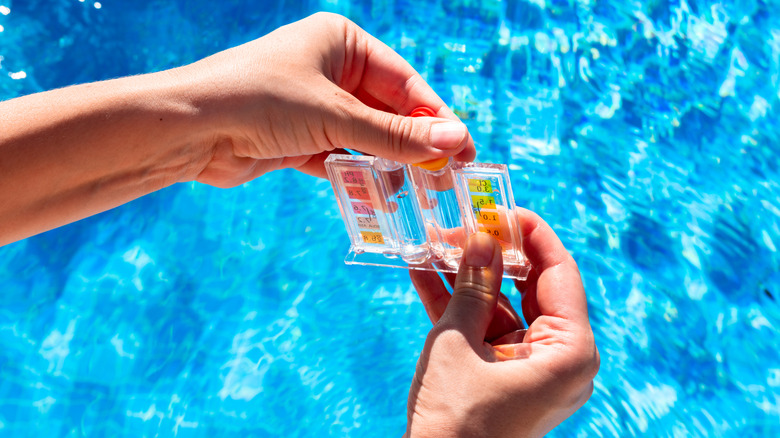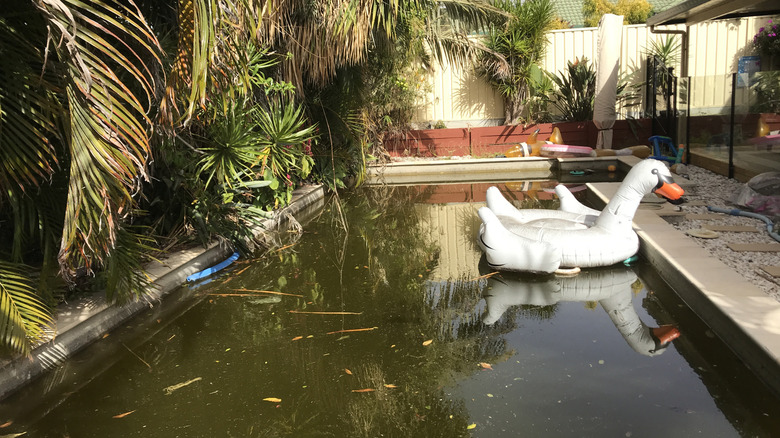Why Your Pool Water Looks So Cloudy (& The Best Way To Fix It)
Every pool owner knows the pain. You stroll by one morning and glance over with the startling realization that your pool water looks like Pineapple Papaya Passionfruit Softsoap, or perhaps like Olympic swimmer Katie Ledecky has been practicing her milk-balancing trick in your pool.
Cloudy water is one of the more common problems with in-ground swimming pools, and so Hunker spoke exclusively with Jimmie Meece, President of America's Swimming Pool Company, to fill us in on the causes and solutions for a cloudy pool. As Meece told us, "Cloudy pool water is most commonly caused by an imbalance in the pool's chemistry, low chlorine levels, improper pH, or high levels of contaminants like dirt, algae, or oils." Many of these causes are interrelated; low chlorine levels in conjunction with high levels of certain contaminants, like body oils, can result in what's called "combined chlorine," and a cloudy pool.
Of course, whenever contaminants are an issue, you should also have a look at potential issues with your filter, whether it's a DE, cartridge, or sand model. "Another common cause is poor filtration," Meece said, "which can result from a clogged filter or not enough filtration time.”
How to treat a cloudy pool
The best prescriptions for a cloudy pool are often familiar to any pool owner: Balancing the pool's chemistry and doubling down on filtration. "To treat cloudy water, check and balance the pool's pH, alkalinity, and sanitizer levels first," Jimmie Meece told Hunker, when we spoke to him exclusively about problems with pool cloudiness. "Shocking the pool with a high dose of chlorine can help destroy any harmful bacteria, combined chlorine, or algae that could be lingering in the pool."
It's no surprise that one way of dealing with low chlorine levels is to raise the chlorine level in your swimming pool. Pool owners will be familiar with the need to occasionally shock a pool with an unusually large amount of chlorine. However, if that's not successful, regular filter maintenance and adjustments also enter the picture when you're coping with cloudiness in your pool. "It's also important to clean or replace the filter if it's clogged," Meece said, "and make sure the filtration system runs long enough each day to properly clear the water." Pool filtration systems are typical run at least eight hours per day, but it's common to increase that number to as many as 12 hours when dealing with cloudy water and other issues that might be impacted by better filtration.
If all goes well, you should start to see results from your corrective measures within a day or two. That said, it can take longer, depending on the degree of cloudiness that is present in the water. So be patient, don't stare at the clock, and monitor your pool water closely. Meanwhile, consider that other, rarer problems could also be a factor.
Other, less common causes of pool cloudiness
Another thing pool owners know all too well is that there's rarely just one or two possible causes of any particular problem. Sometimes, you're unlucky enough to draw the short straw, and find your water still looking murky even after doing the usual catch-all tricks.
"Less frequent causes of cloudy pool water can include high levels of calcium hardness, which can cause scaling and cloudy water, or the presence of metals like iron or copper, which can discolor the water," Jimmie Meece of America's Swimming Pool Company told Hunker, in our exclusive interview. Calcium hardness can usually be treated by gradually diluting the hard water with added tap water... assuming the tap water isn't hard, as well. If it is, you should consider a water softener system. Of course, milk is an excellent source of calcium, so we're looking at you again, Katie Ledecky. In addition to hard water and swimming phenoms, you might also be contending with the buildup of everyday stuff that finds its way into a pool. "Contamination from body lotions, sunscreen, or excessive organic debris can also contribute to cloudiness," Meece explained.
In the grand scheme of things, there are a lot of potential issues that could cause this problem in your pool. Following Meece's advice, though, your first go-to is to check the levels, shock the pool, and cross your fingers it's not a more complex issue.


